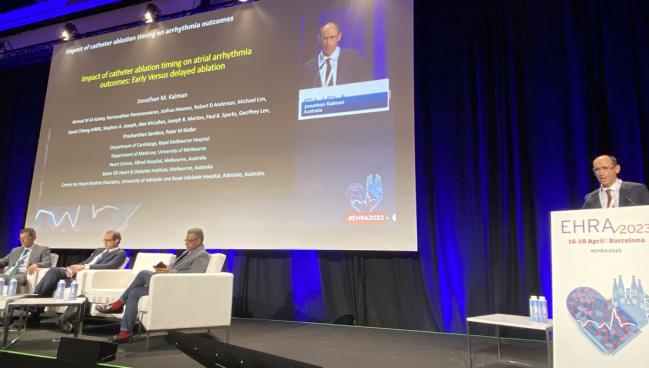Outcomes Just as Good With Delayed vs Early AF Ablation
The study takes some urgency out of AF ablation in newly diagnosed patients, allowing for optimization on antiarrhythmics.

BARCELONA, SPAIN—For patients with paroxysmal and persistent atrial fibrillation (AF), delaying catheter ablation for 12 months while optimizing antiarrhythmic drug therapy has no impact on arrhythmia-free survival when compared with a strategy of immediate catheter ablation, according to a small study presented this week at the European Heart Rhythm Association (EHRA) 2023 congress.
These new results should take some of the rush out of getting AF patients immediately into the lab for ablation, said lead investigator Jonathan Kalman, MBBS, PhD (Royal Melbourne Hospital/University of Melbourne, Australia), during his late-breaking clinical trial presentation.
“These data, I think, provide some reassurance that we can, when appropriate, treat our patients with early medical therapy if that is reasonable both to the physician and to the patient,” said Kalman.
John Camm, MD (St. George’s University Hospitals NHS Foundation Trust, London, England), who discussed the results following Kalman’s presentation, said recent observational studies, as well as data from a large claims database, “gave an urgency” to catheter ablation in newly diagnosed AF patients. These new results will help reassure patients and physicians that it’s alright to move slower if necessary.
“My impression on the whole is that this was an excellent effort to put some balance back into the system so we don’t feel the urgency to immediately move ahead with the proposed ablation,” said Camm. “We can feel more comfortable if we have long waiting lists or if we can’t undertake an ablation right there and then. When appropriate, it is not a problem to treat people medically, at least for a while.”
Carlo Morillo, MD (University of Calgary/Libin Cardiovascular Institute, Canada), who wasn’t involved in the trial, told TCTMD that delays from the time of diagnosis to catheter ablation of AF are inevitable.
“In our healthcare system, and in most of the world, there are waitlists,” Morillo said. “We have waitlists all around Canada of 12 to 18 months. It’s not realistic to do first-line ablation within the first 12 months. What’s nice about this study is that good antiarrhythmic therapy is pretty effective—there’s no differences in outcomes in this small but pretty compelling clinical trial.”
Time to Diagnosis Gains Supporters
In recent years, the “diagnosis-to-ablation time” concept has gained a lot of traction among electrophysiologists and other specialists “as an important determinant of AF ablation outcomes,” said Kalman.
In a 2022 meta-analysis of six observational studies, a shorter duration between the time of AF diagnosis and ablation was associated with a lower relative risk of AF recurrence. Other data showed that for each 1-year increase in the diagnosis-to-ablation time, the risk of AF recurrence increased by 20%. In the aforementioned study of claims data, researchers showed a linear relationship between diagnosis-to-ablation time and AF recurrence, suggesting there was no threshold in which earlier ablation might not be best.
The bottom line is, sure, we can wait, but ablation continues to be best therapy. Carlo Morillo
To test the concept, Australian researchers randomized 100 patients with a diagnosis of AF to early catheter ablation (< 1 month) or a delayed strategy where they were first optimized on antiarrhythmic therapy with aggressive management of sinus rhythm and then treated with catheter ablation at 12 months. The mean age of patients was 58 and 60 years, respectively, in the immediate- and delayed-treatment groups and persistent AF was present in 55% and 37% of patients, respectively. More than half of patients had hypertension. At the study’s completion, complete data were available for 89 patients.
For the study’s primary endpoint, which was atrial arrythmia-free survival at 12 months after catheter ablation, there was no significant difference between the two strategies. Any atrial arrhythmia recurrence was documented in 43.7% and 41.4% of patients who underwent early and late catheter ablation, respectively (P = 0.82).
There also was no significant difference in AF burden between the early and late strategies 12 months after the ablation was performed, nor was there any significant difference in arrhythmic drug use. These findings were consistent in patients with persistent and paroxysmal AF.
In terms of AF symptoms, early catheter ablation significantly improved the mean AF Symptom Severity Scores at 12 months. However, Kalman pointed out there was also a significant improvement in AF symptoms in patients treated with antiarrhythmic drug therapy at 12 months, with these symptoms assessed prior to undergoing catheter ablation. After the patients in the delayed arm underwent ablation, there was a further improvement in AF symptoms, he said.
AF Will Worsen Over Time
To TCTMD, Morillo pointed out that the study included relatively young patients without a lot of comorbidities and without large left atria. Additionally, two-thirds of patients treated with the delayed strategy had paroxysmal AF. “It’s the perfect candidate where you can wait before you pull the trigger and have to really do the ablation,” he said.
Morillo said there are several clinical trials, including the recently published PROGRESSIVE-AF, showing that ablation significantly reduces the progression of AF when compared with antiarrhythmic drug therapy. “That tells us that ablation may modify the substrate to an extent that it prevents progression,” he said. “The bottom line is, sure, we can wait, but ablation continues to be best therapy.”
Camm, in his discussion of the trial, praised the Australian researchers for their work, noting it would have been very difficult to pull off in some countries.
“I don’t think this trial would be possible in many parts of the world, certainly not in the United States,” said Camm. “It would be difficult to do in the United Kingdom. Having patients who are referred for consideration of an ablation, and then accepted for an ablation but telling them, ‘By the way, we would like to randomize you to a group where will do the case now or another group you may fall into which will have the procedure in 12 months.’ That’s a very difficult trial to contemplate.”
Still, the current trial is relatively small, and included a wide range of patients, such those with and without heart failure, said Camm. He noted there were some imbalances in patient characteristics, such as numerically more (but not significantly so) heart failure and persistent AF in the early treatment group, and this may have favored the delayed-intervention strategy. “I do think we have to worry about that aspect of the trial,” he said.
Michael O’Riordan is the Managing Editor for TCTMD. He completed his undergraduate degrees at Queen’s University in Kingston, ON, and…
Read Full BioSources
Kalman J. Impact of catheter ablation timing on atrial arrhythmia outcomes: early versus delayed ablation. Presented at: EHRA 2023. April 16, 2023. Barcelona, Spain.
Disclosures
- Kalman reports research and fellowship support from Biosense Medical and Medtronic.





Comments